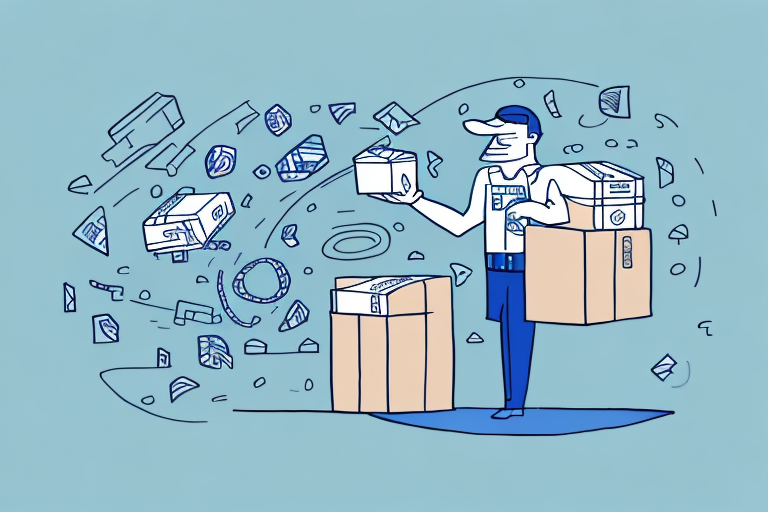How to Become an Independent Courier: A Step-by-Step Guide
Are you looking for a career that allows you to be your own boss and offers the potential for high earnings? Consider becoming an independent courier, where you can enjoy the freedom of running your own business while providing an essential service to the community.
Benefits of Becoming an Independent Courier
The demand for efficient and reliable delivery services has grown significantly in recent years, thanks to the rise of e-commerce and online shopping. According to Statista, global e-commerce sales are expected to reach $6.54 trillion by 2023. As an independent courier, you can tap into this booming market and offer a range of delivery services to businesses and individuals in your area. With low start-up costs and the potential for high earnings, becoming an independent courier is an attractive career option for anyone looking to start a business or switch careers.
One of the benefits of being an independent courier is the flexibility it offers. You can choose your own working hours and decide which jobs to take on. This means you can work around other commitments, such as family or education, and have more control over your work-life balance.
Another advantage is the opportunity to build strong relationships with your clients. By providing a reliable and efficient service, you can establish a loyal customer base and benefit from repeat business, leading to a steady stream of income and a sense of job security.
Steps to Start Your Independent Courier Business
Step 1: Understanding the Role of an Independent Courier
As an independent courier, your primary responsibility is to collect and deliver packages from one location to another, ensuring they reach their destination safely and on time. Effective route planning and time management are essential to handle your workload efficiently and meet your clients' expectations.
Excellent communication skills are crucial to keep your clients informed about the status of their packages. You may also need to handle customer inquiries and complaints, so it's essential to be patient and professional in your interactions.
Moreover, having the necessary insurance coverage is vital to protect yourself and your clients' packages. This includes liability insurance, cargo insurance, and vehicle insurance to cover any potential damages or losses during transit.
Step 2: Researching the Market and Identifying Your Target Customers
Thorough market research is key when starting any business, and the courier industry is no different. Analyze your local market to identify potential customers, such as small businesses, individuals, and online sellers. Utilize market research tools like Statista or IBISWorld to determine the current demand for courier services in your area and understand what your competitors are offering.
Step 3: Developing a Business Plan for Your Courier Venture
A comprehensive business plan is essential for your courier business. It should include your business structure, the services you will offer, your pricing strategy, and your marketing plan. Outline your expected expenses and revenue to assess the viability of your venture.
Additionally, your business plan should detail how you will manage and track your deliveries, as well as any technology or software you plan to use to streamline your operations. A solid plan ensures that your courier venture runs smoothly and efficiently, providing top-notch service to your customers.
Step 4: Registering Your Business and Obtaining Necessary Licenses and Permits
Before launching your courier business, register your business and obtain any necessary licenses or permits required by your local authorities. Check with your local government agencies to identify the requirements in your area, ensuring compliance with all relevant regulations.
Requirements for licenses and permits may vary depending on the type of courier services you plan to offer. For example, transporting hazardous materials may require additional permits and certifications. Similarly, some states or cities may require a special license for operating a commercial vehicle. Research and understand all the necessary requirements to avoid legal issues down the line.
Step 5: Setting Up a Reliable and Efficient Delivery System
To succeed as an independent courier, provide reliable and efficient delivery services. Invest in quality vehicles, such as vans or trucks, and develop effective delivery systems and processes. Utilize technology, such as GPS tracking and route planning software, to streamline your operations and improve delivery times.
Establish clear communication channels with your clients, providing accurate and up-to-date information about their deliveries, including estimated delivery times and potential delays. This builds trust and loyalty, ensuring repeat business.
Prioritize safety by regularly maintaining and inspecting your vehicles and ensuring that your drivers are properly trained and licensed. Implement safety protocols, like wearing seat belts and adhering to traffic laws, to minimize the risk of accidents and injuries, protecting your business and clients.
Pricing Your Services Competitively
Setting competitive prices is crucial for attracting and retaining customers. Research your competitors' pricing structures to ensure your rates are competitive. Consider offering discounts or promotions to attract new customers and regularly review your pricing strategy to maximize profits.
When pricing your services, consider the value you offer, including service quality, expertise, and additional benefits such as same-day delivery or personalized customer service. Highlighting your unique value can justify slightly higher rates while remaining competitive in the market.
Building a Strong Client Base
Building a strong client base is essential for your courier business's success. Network with potential customers, such as small businesses, online sellers, and individuals in your community. Offer exceptional customer service by providing timely and reliable deliveries, encouraging referrals and recommendations from satisfied customers.
Establish a strong online presence by creating a website or social media accounts to showcase your services and provide easy contact access for potential clients. Utilize online advertising and search engine optimization (SEO) techniques to increase visibility and attract new customers.
Offer special promotions or discounts to new clients to incentivize them to try your services. Always maintain a professional and courteous demeanor in interactions with clients, as word of mouth can be a powerful tool in building a positive reputation and attracting new business.
Managing Challenges and Risks
The Challenges and Risks Involved in Being an Independent Courier
Being an independent courier comes with challenges and risks, such as accidents, theft, and equipment breakdowns, which can impact your ability to deliver packages on time and damage your reputation. Having robust insurance coverage and risk management strategies is essential to protect your business and clients.
Strategies for Managing Risks and Ensuring Customer Satisfaction
Develop effective risk management strategies, including investing in comprehensive insurance coverage, working with trusted partners and suppliers, and creating contingency plans for unexpected events. Prioritize customer satisfaction by providing timely and reliable deliveries, responding promptly to customer inquiries and issues, and maintaining a professional demeanor.
Regularly gather feedback from customers through surveys or direct requests to identify areas for improvement. Implement necessary changes to better meet customer needs and communicate any updates or changes in your services to build trust and loyalty.
Scaling and Growing Your Courier Business
As your courier business grows, scaling up your operations to meet increasing demand is essential. This may involve expanding your service area, investing in additional vehicles and equipment, and hiring staff to manage the workload. Develop a long-term growth strategy aligned with your business goals and regularly review your progress.
Leverage technology by investing in reliable courier management software to streamline operations, improve communication with customers, and track deliveries in real-time, increasing efficiency and customer satisfaction.
Enhance your marketing strategy by promoting changes and new services to your target audience using social media, email marketing, and other digital channels. Offer promotions or discounts to attract new customers, fostering brand awareness and growth.
Tools and Resources for Success
Tools and Technologies to Streamline Your Operations
Utilize various tools and technologies to enhance your efficiency as an independent courier. This includes route planning software, GPS tracking devices, and delivery management apps. These tools help reduce operational costs and provide better service to clients.
Resources for Ongoing Learning and Professional Development
Stay up-to-date with industry trends and best practices by joining industry associations, attending conferences and workshops, and networking with other courier professionals. These activities provide opportunities for ongoing learning and professional development, ensuring your business remains competitive and informed.
Starting and running a successful courier business requires hard work, resilience, and a passion for delivering exceptional service. By following these steps and strategies, you can set yourself up for success and create a thriving business that offers excellent value to your clients and your community.




















